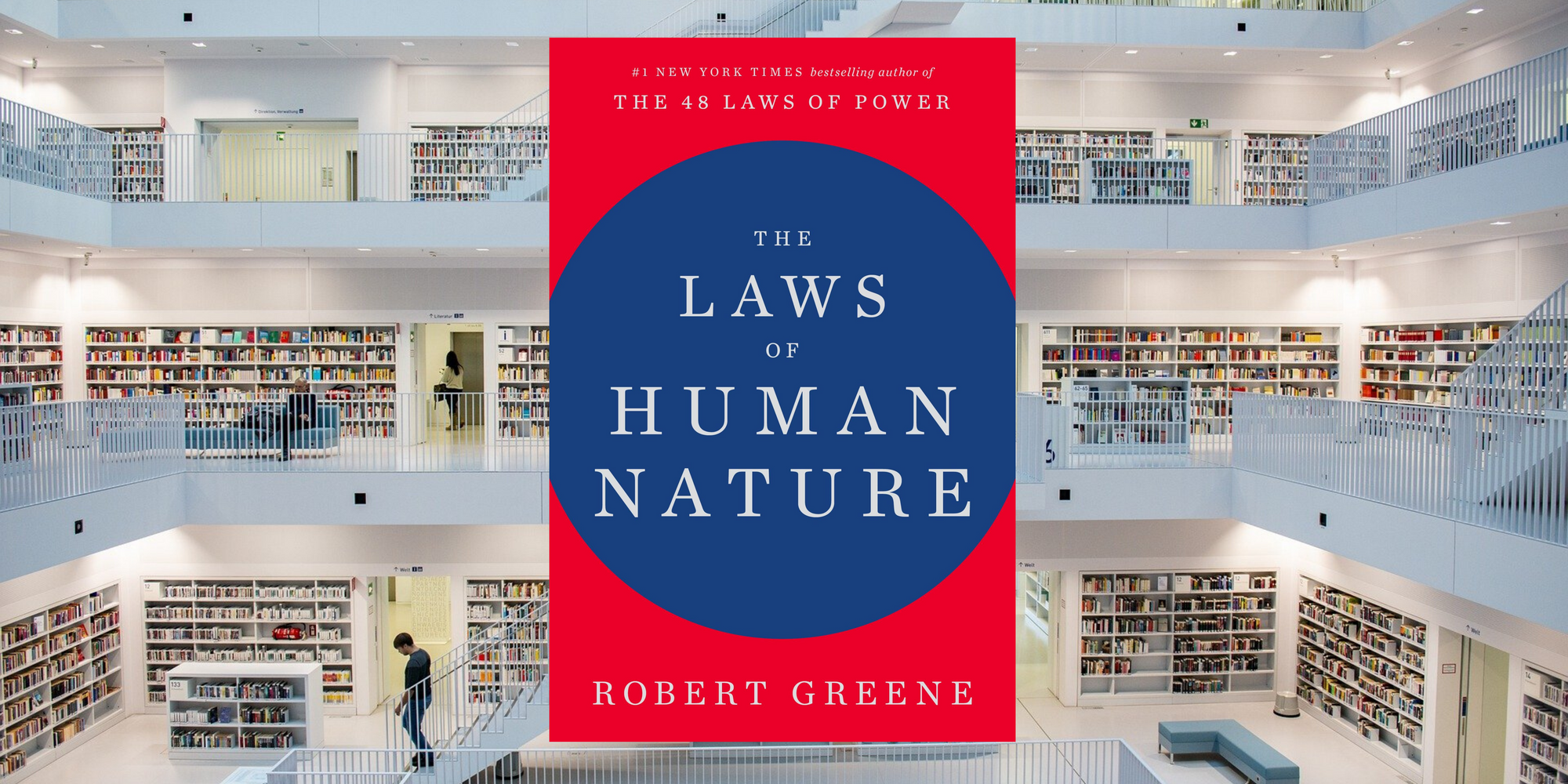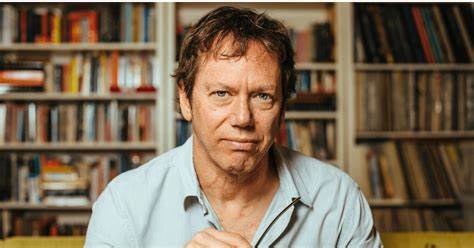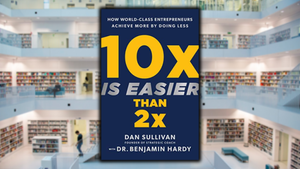
Summary:
If I had had The Laws of Human Nature as a textbook in school, I would have learned something while I was there. Seriously, there is just so much here, and I doubt that anyone who has ever made a serious effort to absorb its lessons hasn't been fundamentally transformed by what Robert Greene has to teach.
We're speaking here in this book about human nature, one of the most expansive topics one could ever hope to cover in a single volume. So of course, you're not going to suddenly "understand people'' by reading it once through, but I would argue that there's not much else that could be a better use of your time.
We deal with other people all day long, and we're constantly confused and deceived by their words and actions. They do things we don't understand, for reasons we don't have access to, and not all of them have our best interests at heart. So this book is just as much about self-defense as it is about reigning in your own nature and improving the quality of your own close relationships.
But I wouldn't be doing justice to human beings if I made you think that The Laws of Human Nature is all about protection from the negative aspects of human nature. It's not that at all. Human beings are astonishing, spectacular, and extraordinary. We are amazing in our ability to connect with one another, solve problems together, console each other when faced with the inherent tragedies of human existence, and simply rise above our circumstances.
Human beings are powerful, impressive, and awesome - but we're complicated. No one has figured us out yet, and with billions of different people all running into each other, speaking all these different languages, and carrying all these different struggles inside of themselves, we're bound to enter into conflict with one another sometimes. This book is about turning inward, and understanding ourselves in new ways, so that we can take that newfound understanding back into the world with us, and co-exist without tearing ourselves and each other apart.
These chapter headings give a pretty good idea of what else you can expect:
*Master Your Emotional Self
*Transform Self-Love into Empathy
*See Through People's Masks
*Determine the Strength of People's Character
*Beware the Fragile Ego
*Advance with a Sense of Purpose
*Resist the Downward Pull of the Group
*Make Them Want to Follow You
*See the Hostility Behind the Friendly Facade
*Meditate on Our Common Mortality
So yea, there's a lot here. And at 588 pages, reading it all the way through is more than a little bit of a commitment. But as I'm sure you'll find out below, it's most likely one of the absolute best uses of your time.

Key Ideas:
#1: People are extraordinarily complex, and you don't even understand yourself! You could study the behaviors and underlying motivations of humans for decades, and you would still find yourself learning new things all the time. However, by turning inward, by studying yourself and your reactions to outside events and how you respond to other people, you can begin to make a little bit of sense out of what other people are up to.
#2: "The greatest danger you face is your general assumption that you really understand people and that you can quickly judge and categorize them. Instead, you must begin with the assumption that you are ignorant and that you have natural biases that will make you judge people incorrectly. The people around you present a mask that suits their purposes. You mistake the mask for reality.
Let go of your tendency to make snap judgments. Open your mind to seeing people in a new light. Do not assume that you are similar or that they share your values. Each person you meet is like an undiscovered country, with a very particular psychological chemistry that you will carefully explore. You are more than ready to be surprised by what you uncover.
This flexible, open spirit is similar to creative energy - a willingness to consider more possibilities and options. In fact, developing your empathy will also improve your creative powers."
#3: Like everyone, you think you are rational, but you are not. We feel first, and then use our brain to come up with reasons to explain our actions. The feeling part of our brains is incredibly ancient, and though it's flattering to think that we consult our prefrontal cortex to come up with intelligent, reasoned decisions regarding how to direct our behavior, this isn't always true. We need both brains working together, and you can't afford to neglect one in favor of the other.
#4: The circumstances surrounding our birth and our childhood affect many of our unconscious decisions and reactions, but we are also powerfully guided by our subconscious fear of death. This applies to pretty much every single human being on earth.
#5: Always pay extra attention to how people respond in times of high stress. How people handle power and responsibility will also tell you a lot about them. We often think that people who lash out under stress are acting "out of character," when, in reality, they are showing more of their true character.
#6: People of real, pure strength and wisdom are exceedingly rare (well, I mean they’re everywhere, but they’re not as common as one would hope). If you're lucky enough to find someone who exhibits this kind of grace, elegance, and wisdom, hold onto them for dear life. Don't idolize them - I mean, they are people just like you and me - but they are very special and can have an extraordinary impact on your life.
#7: Many times, people will behave exactly as you expect them to behave. Human social life is so incredibly interconnected that people will respond to our unconscious expectations of them. The reverse is also true.
#8: It's exceptionally hard to change other people, and you can wear yourself out trying. The most you can do is work on yourself, and be a better example for others, modeling the kind of behavior you'd like to see in them. Because of the interdependence of human beings, this will inspire more change in other people than overtly trying to change them. Work from the inside out.
#9: Guard your character as you would your most prized possession. Lose your friends, you can make new friends; lose your money, you can make more money. But once you've let your own character degrade, it can be next to impossible to dig yourself out of the hole you've dug for yourself. As Heraclitus said, character is destiny.
#10: Aggressive energy cannot be denied or repressed; it will emerge in some other way. As Robert Greene says, “We cannot separate this aggressiveness from the way we attack problems, alter the environment to make our lives easier, fight injustice, or create anything on a large scale. The Latin root of the word 'aggression' means 'to step forward,' and when we assert ourselves in this world and try to create or change anything, we are tapping into this energy." Interestingly, hardly anyone ever admits to being aggressive, either on social media or in their politics, yet we see aggression absolutely everywhere. The split is profound.
#11: “When we turn this around, becoming more aware of our mortality, we experience a taste of true freedom. We no longer feel the need to restrict what we think and do, in order to make life predictable. We can be more daring without feeling afraid of the consequences. We can cut loose from all the illusions and addictions that we employ to numb our anxiety. We can commit fully to our work, to our relationships, to all our actions. And once we experience some of this freedom, we will want to explore further and expand our possibilities as far as time will allow us."

Book Notes:
"To imagine that we are not always in control of what we do is a frightening thought, but in fact, it is the reality."
Specific types of events trigger sudden confidence, insecurity, anxiety, attraction to a particular person, hunger for attention, or a whole slew of other emotions.
"We developed human nature on our own, so we can slowly, painfully, arduously, transform it still further into something better."
"You might be tempted to imagine that this knowledge is a bit old-fashioned. After all, you might argue, we are now so sophisticated and technologically advanced, so progressive and enlightened; we have moved well beyond our primitive roots; we are in the process of rewriting our nature. But the truth is in fact the opposite - we have never been more in the thrall of human nature and its destructive potential than now. And by ignoring this fact, we are playing with fire."
"People are generally dealing with emotions and issues that have deep roots. They're experiencing some desires and disappointments that predate you by years and decades. You cross their path at a particular moment and become the convenient target of their anger or frustration. They're projecting onto you certain qualities they want to see. In most cases, they're not relating to you as an individual."
What often appears out of character is actually more of their true character.
“Man will only become better when you make him see what he is like.”
"Understand: Like everyone, you think you are rational but you are not."
Under close scrutiny, your emotions will lose their hold on you.
The same problems and mistakes keep recurring in our own lives, forming negative patterns. It is hard to learn from experience when we are not looking inward, at the true causes.
Emotions originate as physical arousal designed to capture our attention and cause us to take notice of something around us.
We do not have conscious access to the origins of our emotions and the moods they generate.
The rationality or irrationality of a particular person should be evaluated over time, across a variety of situations.
The most common emotion of them all is the desire for pleasure and the avoidance of pain. This applies to our thoughts as well. This pleasure principle in thinking is the source of all our mental biases.
"The people around you generally appear sane and in control of their lives. But put any of them in stressful circumstances, with the pressure rising, and you will see a different reality."
People have a desperate need to believe in something and they will find it anywhere.
"As long as there are humans, the irrational will find its voices and means of spreading. Rationality is something to be acquired by individuals, not by mass movements or technological progress. Feeling superior and beyond it is a sure sign that the irrational is at work."
If people do not pay attention to us, we cannot connect to them on any level.
We are all on the spectrum of self-absorption.
Creating a self that we can love is a healthy development, and there should be no stigma attached to it. Narcissism is qualitatively different from self-love.
Empathy creates its own upward, positive momentum.
"The greatest danger you face is your general assumption that you really understand people and that you can quickly judge and categorize them. Instead, you must begin with the assumption that you are ignorant and that you have natural biases that will make you judge people incorrectly. The people around you present a mask that suits their purposes. You mistake the mask for reality.
Let go of your tendency to make snap judgments. Open your mind to seeing people in a new light. Do not assume that you are similar or that they share your values. Each person you meet is like an undiscovered country, with a very particular psychological chemistry that you will carefully explore. You are more than ready to be surprised by what you uncover. This flexible, open spirit is similar to creative energy - a willingness to consider more possibilities and options. In fact, developing your empathy will also improve your creative powers."
"You can enter the spirit of the other person. You absorb their mood deeply and reflect it back to them. You create a feeling of rapport. People secretly crave this emotional rapport in their daily lives, because they get it so rarely. It has a hypnotic effect and appeals to people's narcissism as you become their mirror."
Abraham Lincoln: “I don’t like that man. I must get to know him better.”
People’s values are often formed in childhood, based on their parents and their relationship with them.
"Your goal, then, is to gather as much as you can about the early years of the people you are studying and their relationship to their parents and siblings. Keep in mind that their current relationship to family will also speak volumes about the past. Try to get a read on their reactions to authority figures. This will help you see to what extent they have a rebellious or submissive streak. Their taste in partners will also say a lot."
Try to see people as they interact with others besides you - people are often very different depending on the person they are involved with.
Try to focus not on categories but on the feeling tone and mood that people evoke in you, which is continually shifting.
William James: “The deepest principle of Human Nature is the craving to be appreciated.”
Secretly, people yearn to let go of their resistance. It is exhausting to continually be so defensive and suspicious.
The key to employing empathy within a relationship is to understand the value system of the other person, which inevitably is different from yours.
Such close attention is so rare that it can pull almost anyone out of their shell.
"Understand: What makes us develop these empathic powers is necessity. If we feel our survival depends on how well we gauge the moods and minds of others, then we will find the requisite focus and tap into the powers."
"The first step, then, is the most important: to realize you have a remarkable social tool that you are not cultivating. The best way to see this is to try it out. Stop your incessant interior monologue and pay deeper attention to people. Attune yourself to the shifting moods of individuals and the group. Get a read on each person's particular psychology and what motivates them. Try to take their perspective, enter their world and value system.
You will suddenly become aware of an entire world of nonverbal behavior you never knew existed, as if your eyes could now suddenly see ultraviolet light. Once you sense this power, you will feel its importance and awaken to new social possibilities."
Walt Whitman: “I do not ask the wounded person how he feels...I myself become the wounded person.”
"Nonverbal communication cannot be experienced simply through thinking and translating thoughts into words but must be felt physically as one engages with the facial expressions or locked positions of other people."
"We imagine we are almost always being sincere in our social encounters, which any good actor will tell you is the secret behind really believable acting. We take these skills for granted, but to see them in action, try to look at yourself as you interact with different members of your family and with your boss and colleagues at work.
You will see yourself subtly changing what you say, your tone of voice, your mannerisms, your whole body language, to suit each individual and situation. For people you are trying to impress, you wear a much different face than with those with whom you are familiar and can let down your guard. You do this almost without thinking."
"We have a continual desire to communicate our feelings and yet at the same time the need to conceal them for proper social functioning. With these counterforces battling inside us, we cannot completely control what we communicate. Our real feelings continually leak out in the form of gestures, tones of voice, facial expressions, and posture.
We are not trained, however, to pay attention to people's nonverbal cues. By sheer habit, we fixate on the words people say, while also thinking about what we'll say next. What this means is that we are using only a small percentage of the potential social skills we all possess."
When you are aware of a person’s usual demeanor, you can pay greater attention to any deviations.
"Pay great attention to any mixed signals you pick up: a person professes to love your idea, but their face shows tension and their tone of voice is strained, or they congratulate you on your promotion, but the smile is forced and the expression seems sad. Such mixed feelings are very common."
"With mixed signals, you need to be aware that a greater part of nonverbal communication involves the leakage of negative emotions, and you need to give greater weight to the negative cue as indicative of the person's true feelings."
Everything people do is a sign of some sort; there is no such thing as a gesture that does not communicate.
You will often read into people’s gestures and cues things related to your like or dislike of that person. During observation, you must subtract your personal preferences and prejudices about people.
The three categories of the most important cues to observe and identify are: dislike/like, dominance/submission, and deception.
"Understand: People's hostile or resistant actions never come out of the blue. There are always signs before they take any action. It is too much of a strain for them to completely suppress such strong emotions."
"People give out clear indications in their body language of active dislike or hostility. These include the sudden squinting of the eyes at something you have said, the glare, the pursing of the lips until they nearly disappear, the stiff neck, the torso or feet that turn away from you while you are still engaged in a conversation, the folding of the arms as you try to make a point, and an overall tenseness in the body. The problem is that you will not usually see such signs unless a person's displeasure has become too strong to conceal at all."
"Keep in mind that people will tend to leak out more of their true feelings, and certainly hostile ones, when they are drunk, sleepy, frustrated, angry, or under stress. They will later tend to excuse this, as if they weren't themselves for the moment, but in fact they were actually being more themselves than ever."
"People who feel positive emotions for you will display noticeable signs of relaxation in the facial muscles, particularly in the lines of the forehead and the area around the mouth; their lips will appear more fully exposed and the whole area around their eyes will widen."
There is no genuine smile without a definite change in the eyes and cheeks.
"A voice that is animated and happy tends to infect us with the mood and elicit a similar response. We know it when we feel it, but often we ignore these feelings and instead concentrate on the friendly words or sales pitch."
"The feeling of being in a superior social position gives people a confidence that will radiate outward in their body language. Some feel this confidence before they attain a position of power, and it becomes a self-fulfilling prophecy as others are drawn to them."
"Confidence usually comes with a greater feeling of relaxation that is clearly reflected in the face, and with a greater freedom of movement. Those who are powerful will feel allowed to look around more at others, choosing to make eye contact with whomever they please. Their eyelids are more closed, a sign of seriousness and competence. If they feel bored or annoyed, they show it more freely and openly. They often smile less, frequent smiling being a sign of overall insecurity. They feel more entitled to touch people, such as with friendly pats on the back or on the arm. In a meeting, they will tend to take up more space and create more distance around themselves. They stand taller, and their gestures are more relaxed and comfortable. Most important, others feel compelled to imitate their style and mannerisms. The leader will tend to impose a form of nonverbal communication on the group in very subtle ways. You will notice people mimicking not only their ideas but also their calm or more frenetic energy."
When someone is trying to hide something, exaggerated motions and big smiles tend to cover up tension and anxiety in other parts of the body.
Pay attention to nonverbal forms of emphasis that come a little too early or a little too late, as though to create an added effect.
Certain looks are more expressive than words.
You want to seem like you were destined for success, a mystical effect that always works.
The last words of Emperor Augustus: “Have I played my part in the farce of life well enough?”
If we displayed exactly who we are and spoke our minds truthfully, we would offend almost everyone and reveal qualities that are best concealed.
"The better you play your role, the more power you will accrue, and with power, you will have the freedom to express more of your peculiarities. If you take this far enough, the persona you present will match many of your unique characteristics, but always heightened for effect."
People never do anything just once. They will inevitably repeat their behavior.
Even a positive trait such as intelligence is worthless if the person also happens to be of weak or dubious character.
Heraclitus: “Character is destiny.”
Make figuring out the true character of other people your primary focus, and move beyond the front that they present to the world. Your success and happiness depend on staying away from toxic people and surrounding yourself with people of strong character.
There are three layers of our character, which are: genetics, early childhood development, and our habits and experiences in later life.
The most significant indicator of people’s character comes through their actions over time.
People will often repeat behaviors that go against their own self-interest, revealing the compulsive nature of their weaknesses.
Always pay extra attention to how people respond in times of high stress.
How people handle power and responsibility will also tell you a lot about them.
So often we think that power has changed people, when in fact it simply reveals more of who they are.
Introverts and extroverts do not naturally understand each other.
There are generally more extroverts than introverts in the world.
Strong characters come from genetics, secure parenting, good mentors along the way, and constant improvement.
"Strong character has a tensile quality like a good piece of metal - it can give and bend but still retains its overall shape and never breaks."
"Weak character will neutralize all of the other possible good qualities a person might possess."
"People of real strength are as rare as gold, and if you find them, you should respond as if you had discovered a treasure."
"Understand: Instead of focusing on what you want and covet in the world, you must train yourself to focus on others, on their repressed desires and unmet fantasies."
"People do not want truth and honesty, no matter how much we hear such nonsense endlessly repeated. They want their imaginations to be stimulated and to be taken beyond their banal circumstances. They want fantasy and objects of desire to covet and grope after. Create an air of mystery around you and your work. Associate it with something new, unfamiliar, exotic, progressive, and taboo. Do not define your message but leave it vague. Create an illusion of ubiquity - your object is seen everywhere and desired by others. Then let the covetousness so latent in all humans do the rest, setting off a chain reaction of desire."
Learn to imagine what other people want from us instead of just what we want from them.
As soon as people think that they possess you, they start to lose interest.
Our path must always be towards greater awareness of our nature.
We spend so much time trying to escape our circumstances, and so little in trying to understand more deeply our own living reality.
Any phenomenon in the world is by nature complex.
"Knowing that time will reveal the weaknesses of your plans, you become more careful and deliberative with them."
Feeling organically connected to who you were in the past gives you a strong sense of identity.
"Never attack people for their beliefs or make them feel insecure about their intelligence or goodness - that will only strengthen their defensiveness and make your task impossible."
People are hesitant to call into question their own judgment and intelligence. For this reason, once they begin helping you, doing small favors for you in the beginning, they will be reluctant to stop.
Bruyere: “He who goes away pleased with himself and his own wit is also greatly pleased with you. Most men seek less to be instructed, and even to be abused than to be praised and applauded.”
There are three qualities to people’s self-opinion that are nearly universal: “I am autonomous, acting of my own free will”; “I am intelligent in my own way”; and “I am basically good and decent.”
Since the game of influence is unavoidable, better to be skillful at it than in denial or merely improvising in the moment.
To make people want to help you, make it seem like something they want to do, and something they chose to do themselves. Framing it as something pleasurable, as a rare opportunity, and as something other people want to do will generally have the proper effect.
Smaller gifts are better than larger gifts in that they don’t come with the sense that one is being bought.
Remind people of what they have done for you in the past, not what you have done for them. That way, you reinforce their self-identity as a generous person and avoid making them feel helpless.
Praising people for things they know they’re bad at will backfire, but aiming your praise at the things they are uncertain about will allay their insecurities.
It’s best to start off a little bit cold in your interactions so you have some room to warm up later.
How can people not follow your advice when you use the exact same words that they have used themselves?
"See people as facts of nature. They come in all varieties, like flowers or rocks."
Richard Nixon: “Always remember, others may hate you, but those who hate you don’t win unless you hate them, and then you destroy yourself.”
"With these shows and the news we can always become moralistic and talk of how much we despise such villains, but the truth is that the culture constantly feeds us these figures because we are hungry for expressions of the dark side.
All of this provides a degree of release from the tension we experience in having to play the angel and seem so correct."
We tend to admire successful people’s creativity and work ethic while subtracting their darker qualities, whereas it may be these darker qualities, and their integration, that helped them toward their success.
Subtract their shadow side, and many successful people would just be the same as everyone else.
You pay a greater price by always being so nice and deferential than you would by showing more of your shadow.
Entire groups of people can be unified through their underlying envy, directed at a particular group.
Nietzsche: “The serpent that stings us means to hurt us and rejoices as it does so; the lowest animal can imagine the pain of others. But to imagine the joy of others and to rejoice at it is the highest privilege of the highest animals.”
Try to pay less attention to the applause as it gets louder.
"Today, in the Western world, religions and great causes have lost their binding power; we find it hard to believe in them and to satisfy our grandiose energy through identification with a greater power. The need to feel larger and significant, however, does not simply disappear; it is stronger than ever. And absent any other channels, people will tend to direct this energy toward themselves. They will find a way to expand their sense of self, to feel great and superior. Although rarely conscious of this, what they are choosing to idealize and worship is the self. Because of this, we find more and more grandiose individuals among us."
"When people go extra far in repressing their feminine or masculine qualities, these will tend to leak out in a caricatured form."
"The outer conflict between the genders is merely a reflection of an unresolved inner conflict. As long as the inner feminine or masculine is denied, the outer distance will only grow."
In primitive myths, the earliest humans were both male and female; this made them so powerful that the gods feared them, and split them in half.
“We are compelled by nature to want to move closer to what is feminine or masculine, in the form of an attraction to another person. But if we are wise, we realize we are equally compelled to do so inwardly. For centuries men have looked to women as muses, sources of inspiration. The truth is that the muse, for both genders, lies within. Moving closer to your anima or animus will bring you closer to your unconscious, which contains untapped creative treasures."
"Experimenting with the skills and options related to your personality and inclinations is not only the single most essential step in developing a high sense of purpose, it is perhaps the most important step in life in general. Knowing in a deep way who you are, your uniqueness will make it that much easier to avoid all of the other pitfalls of human nature."
The social force, or group energy, exists simultaneously within us and outside us.
We experience a powerful kind of non-verbal validation and sense of self through the eyes of others when they look at us.
We continually consult our smartphones as a kind of substitute pair of eyes upon us.
Certain emotions are more contagious than others, anxiety and fear being the strongest of all.
"Better to be aware that the larger the group and the more established the culture over time, the more likely it will control you than the other way around."
"The best courtiers know how to tailor their flattery to the particular insecurities of the leader and to make it less direct. They focus on flattering qualities in the leader that no one else has bothered to pay attention to but that needs extra validation. If everyone praises the leader's business acumen but not his or her cultural refinement, you will want to aim at the latter. Mirroring the leader's ideas and values, without using their exact words, can be a highly effective form of indirect flattery."
“Not giving what you promised to deliver will feel like something you have taken away. Everyone can talk a good game and promise, and so you seem just like anyone else we encounter, and the disappointment can be profound."
Hardly anyone ever admits to being aggressive, either on social media or in their politics, yet we see aggression absolutely everywhere. The split is profound.
“We cannot separate this aggressiveness from the way we attack problems, alter the environment to make our lives easier, fight injustice, or create anything on a large scale. The Latin root of the word 'aggression' means 'to step forward,' and when we assert ourselves in this world and try to create or change anything, we are tapping into this energy."
Aggressive energy cannot be denied or repressed; it will emerge in some way.
If you stop focusing on people’s words and the facade they present, and concentrate on their actions and their nonverbal cues, you can almost sense the level of aggressiveness they emanate.
The greatest fear of the natural aggressor is the loss of control.
“Human aggression in individuals and in groups tends to emerge or heat up when we feel helpless and vulnerable, when the impatience for control and effect rises. And as increasing numbers of people and groups are feeling this way, we can expect more of this and not less in the future."
“It is only in our awareness that we can start to think of progress.”
“Creative people display great aggressiveness in their thinking, as they try out many options and search for possible solutions. By trying to rid ourselves of any kind of aggressive impulse, we actually thwart our own creative energies.”
We surrender inwardly long before we surrender outwardly.
Almost nothing in the world can resist persistent human energy.
What makes anger toxic is the degree to which it is disconnected from reality.
Your anger should be controlled, realistic, and targeted at the actual source of the problem.
Rollo May: "Power is required for communication. To stand before an indifferent or hostile group and have one's say, or to speak honestly to a friend truths that go deep and hurt, these require self-affirmation, self-assertion, and even at times aggression."
“You are born into a generation that defines you more than you can imagine. Your generation wants to separate itself from the previous one and set a new tone for the world. In the process, it forms certain tastes, values, and ways of thinking that you as an individual internalize.
As you get older, these generational values and ideas tend to close you off from other points of view, constraining your mind. Your task is to understand as deeply as possible this powerful influence on who you are and how you see the world. Knowing in-depth the spirit of your generation and the times you live in, you will be better able to exploit the zeitgeist.
You will be the one to anticipate and set the trends that your generation hungers for. You will free your mind from the mental constraints placed on you by your generation, and you will become more of the individual you imagine yourself to be, with all the power that freedom will bring you."
Nothing in human culture stands still.
Instead of moralizing, you must see things as they really are.
We cannot step outside of the historical moment we are born into.
“Pay close attention to the heroes and icons of a generation, those who act out the qualities that others secretly wish they had as well."
"Like an individual, any generation will tend to have an unconscious, shadow side to its personality."
Incorporate some of the styles and ideals of the younger generations, but not so many as to make yourself look ridiculous. The goal is to create some hybrid that will continue to captivate audiences and crowds.
In relation to time, our active nature is neutralized, and although we do not consciously register this, our helplessness here is the source of much of our anxiety and bouts of depression.
We can literally communicate with the future through our work.
Fyodor Dostoyevsky: "When I look back at the past and think of all the time I squandered in error and idleness, lacking the knowledge needed to live, when I think of how often I sinned against my heart and my soul, then my heart bleeds. Life is a gift, life is happiness, every minute could have been an eternity of happiness! If youth only knew! Now my life will change; now I will be reborn. Dear brother, I swear that I shall not lose hope. I will keep my soul pure and my heart open. I will be reborn for the better."
To combat the uncertainty of death, we seek comfort and routine in other areas such as entertainment and addictions, which paradoxically leads us into a more deathlike state.
“The problem for us humans is that we are aware of our mortality, but we are afraid to take this awareness further.”
The purpose of our consciousness is to always take it as far as we can.
“We can also try to look at the world as if we were seeing things for the last time - the people around us, the everyday sights and sounds, the hum of the traffic, the sound of the birds, the view outside our window.
Let us imagine these things still going on without us, then suddenly feel ourselves brought back to life - those same details will now appear in a new light, not taken for granted or half perceived. Let the impermanence of all life forms sink in. The stability and solidity of the things we see are mere illusions."
Death and love are inextricably interconnected.
Our unique consciousness of death has created our particular form of love.
"Being able to accustom ourselves to some degree of physical pain, without immediately reaching for something to dull it, is an important life skill."
“When we turn this around, becoming more aware of our mortality, we experience a taste of true freedom. We no longer feel the need to restrict what we think and do, in order to make life predictable. We can be more daring without feeling afraid of the consequences. We can cut loose from all the illusions and addictions that we employ to numb our anxiety. We can commit fully to our work, to our relationships, to all our actions. And once we experience some of this freedom, we will want to explore further and expand our possibilities as far as time will allow us."
Montaigne: "Let us rid death of its strangeness, come to know it, get used to it. Let us have nothing on our minds as often as death. At every moment let us picture it in our imagination in all its aspects...It is uncertain where death awaits us; let us await it everywhere. Premeditation of death is premeditation of freedom...He who has learned how to die has unlearned how to be a slave. Knowing how to die frees us from all subjection and constraint."
"And finally, I would like to thank all those innumerable people throughout my life who've shown me the worst and the best in human nature, and who've supplied me endless material for this book."

Action Steps:
So you've finished reading the book. What do you do now?
#1: Take the Self-Authoring course from Dr. Jordan Peterson.
The course consists of writing exercises designed to help you access parts of your personality that have been hidden previously, even from yourself. It's also about setting a direction for your future while acknowledging your own faults and virtues in the present.
#2: Watch a movie or TV show with the sound off.
It's said that if you watch Friends with the sound off, you can still understand most of what's going on.
Try this for yourself, paying special attention to changes in body language when another character enters the room, or when male and female characters are facing each other, talking alone.
#3: Pick someone you don't like, and figure out what you might like about them if you committed to spending a little bit of time with them in a more friendly setting.
Ask yourself what kind of life they might have led up to this point, which needs or desires may have gone unfulfilled in their early lives, or what kind of personal strengths and virtues they may possess.
#4: Examine your feelings about death.
The subconscious fear of death motivates our actions, beliefs, thoughts; everything. It's such a powerful force in most people's lives that it deserves your complete focus and attention, daily if possible. If you can unlearn how to be afraid of death, you can unlearn how to be a slave.
#5: Examine your current group of friends or business partners.
Ask yourself if the group you're associated with now is pulling you down, or lifting you up. Treat yourself right by refusing to associate with anyone who doesn't have your best interests at heart, or who isn't committed to rising together.
#6: Establish a meditation practice.
Learning how to turn inward, settle the mind, and to let insights emerge of their own accord will have tremendously beneficial effects on your life. In meditation, we're learning how to observe our thoughts without judgment, and create some distance between ourselves and our emotions. This is invaluable, and worth whatever time you can dedicate to it. As they say, if you can't find ten minutes to meditate, you need two hours.
#7: Pick one aspect of your character and commit to exploring it exclusively for a month.
Radical personal change is a tall order, and it can't be achieved all at once. You have to make it easier on yourself by taking it piece by piece. Instead of "developing your character," you could choose to examine why you react so negatively to what is considered by someone else to be constructive criticism.
Or you could ask yourself what you're hiding from other people, and whether or not it might be safe, or a good idea, to finally show them the real you. It's your choice, but make it something you've been avoiding, or that have ripple effects in other areas of your life.

About the Author:
Robert Greene (born May 14, 1959) is an American author known for his books on strategy, power, and seduction. He has written six international bestsellers: The 48 Laws of Power, The Art of Seduction, The 33 Strategies of War, The 50th Law (with rapper 50 Cent), Mastery, and The Laws of Human Nature. At one time, The 48 Laws of Power was the number one most-requested book in prison libraries across the United States.
Additional Resources:
Jordan Peterson - Self-Authoring Program
This Book on Amazon:
The Laws of Human Nature, by Robert Greene
If You Liked This Book:
The 48 Laws of Power, by Robert Greene
The Denial of Death, by Ernest Becker
Stillness is the Key, by Ryan Holiday
Ego is the Enemy, by Ryan Holiday
The Art of Seduction, by Robert Greene
12 Rules for Life, by Jordan Peterson





